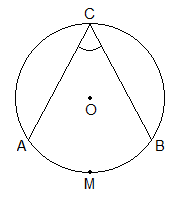Arcs and Angles Subtended by Arcs on a Circle
A portion (part) of the circumference of a circle is called an
arc. In the figure given below, ACB is a part of the circumference of the circle with
centre O. So ACB is an arc. There are minor arcs and major arcs. A minor arc is
less than the half of the circumference and major arc is greater than the half
of the circumference.
********************
10 Math Problems officially announces the release of Quick Math Solver and 10 Math Problems, Apps on Google Play Store for students around the world.
********************
********************
So, arc ACB is a minor arc and the arc ADB is a major arc.
Central angle and its corresponding arc
In the figure given below, O is the centre of the circle in
which OP and OQ are two radii and PRQ is an arc. The arc PRQ subtends an angle
POQ at the centre O. So, ∠POR is called the central
angle and the arc PRQ is its corresponding arc.
Since both the central angle and corresponding arc are
described by the same amount of rotation, therefore the degree measure of arc
PRQ and ∠POQ
are same.
i.e. ∠POQ ≗ arc PRQ
Inscribed angle and its corresponding arc
In the figure given below, O is the centre of the circle in which AB and BC are two chords. The chords AB and BC meet at a point B on the circumference of the circle. So they form an angle ABC at B on the circumference.
The angle on the circumference is called the inscribed angle. So, ∠ABC
is an inscribed angle and arc AMC is its corresponding arc.
Now, to understand and establish the relation between an inscribed angle and
its corresponding arc, let us consider an example of the figure given below:
In DAOB,
∠OAB
= ∠OBA
[∵ OA = OB]
∠OAB
+ ∠OBA + ∠AOB = 180° [Sum of angles of a
triangle]
or, ∠OBA
+ ∠OBA + ∠AOB = 180°
or, 2∠OBA
= 180° - ∠AOB ………………. (i)
In DBOC,
∠OBC
= ∠OCB
[∵ OB = OC]
∠OBC
+ ∠OCB + ∠BOC = 180° [Sum of angles of a
triangle]
or, ∠OBC
+ ∠OBC + ∠BOC = 180°
or, 2∠OBC
= 180° - ∠BOC ………………. (ii)
Adding (i) and
(ii), we have
2∠OBA + 2∠OBC = 180° - ∠AOB + 180° - ∠BOC
or, 2(∠OBA
+ ∠OBC) = 360° - (∠AOB + ∠BOC)
or, 2∠ABC
= 360° - Reflex ∠AOC
or, 2∠ABC
≗ circumference – arc ABC [∵
Circumference ≗ 360° and Ref.∠AOC ≗ arc ABC]
or, 2∠ABC
≗ arc AMC
or, ∠ABC
≗ ½ arc AMC
Thus, the
degree measurement of the angle on circumference of a circle is equal to the
half of the degree measurement of its corresponding arc.
Properties of circle related to arcs and the angles subtended by them:
1. Arcs
subtended by equal angles at the centre of the circle are equal.
2. Angles
subtended by two equal arcs of a circle at the centre are equal.
3. Arcs
cut off by equal chords of a circle are equal. Or, If two chords of a circle
are equal, the corresponding arcs are equal.
4. If
two arcs of a circle are equal, then their corresponding chords are equal.
5. Central
angle of a circle is equal to the degree measurement of its opposite arc.
6. Inscribed
angle of a circle is equal to the half of the degree measurement of its
opposite arc.
7. Degree
measurement of a full circle arc is equivalent to 360°.








0 comments: